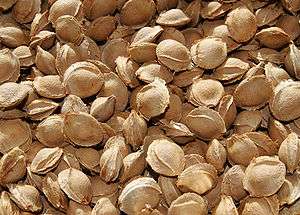Apricot kernel

An apricot kernel is the seed of an apricot.
It is known for containing amygdalin, a poisonous compound that, together with the related synthetic compound laetrile, has been marketed as an alternative cancer treatment. However, studies have found the compounds to be ineffective in the treatment of cancer, as well as potentially toxic or lethal when taken by mouth, due to cyanide poisoning.[1]
Taken in excess, they may produce symptoms of cyanide poisoning, including nausea, fever, rash, headaches, insomnia, increased thirst, weakness, lethargy, nervousness, various aches and pains in joints and muscles, and a drop in blood pressure.
Apricot kernels are sometimes added to soaps or scrubs as an exfoliant.[2]
In 1993, the New York State Department of Agriculture and Markets tested the cyanide content of two 220 gram (8 oz) packages of bitter apricot kernels imported from Pakistan that were being sold in health-food stores as a snack. The results showed that each package, if consumed entirely, contained at least double the minimum lethal dosage of cyanide for an adult human. The apricot pits were recalled and removed from stores.[3] There was one reported case in the medical literature of cyanide toxicity from apricot kernels from 1979 to 1998 in the United States.[4]

References
- ↑ Milazzo S, Ernst E, Lejeune S, Boehm K, Horneber M (2011). "Laetrile treatment for cancer". Cochrane Database Syst Rev (Systematic review) (11): CD005476. doi:10.1002/14651858.CD005476.pub3. PMID 22071824.
- ↑ Alex Muniz. "Exfoliation - AskMen". AskMen. Retrieved 11 June 2016.
- ↑ Imported Bitter Apricot Pits Recalled as Cyanide Hazard By DENNIS HEVESI Published: Friday, March 26, 1993 – The New York Times
- ↑ Suchard JR, Wallace KL, Gerkin RD (December 1998). "Acute cyanide toxicity caused by apricot kernel ingestion". Ann Emerg Med. 32 (6): 742–4. doi:10.1016/S0196-0644(98)70077-0. PMID 9832674.